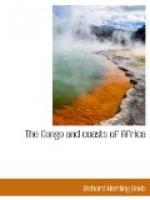These are only two companies. In most of the others half the shares are owned by the King.
As published in the “State Bulletin,” the money received in eight years for rubber and ivory gathered in the Domaine Prive differs from the amount given for it in the market at Antwerp. The official estimates show a loss to the government. The actual sales show that the government, over and above its own estimate of its expenses, instead of losing, made from the Domaine Prive alone $10,000,000. We are left wondering to whom went that unaccounted-for $10,000,000. Certainly the King would not take it, for, to reimburse himself for his efforts, he early in the game reserved for himself another tract of territory known as the Domaine de la Couronne. For years he denied that this existed. He knew nothing of Crown Lands. But, at last, in the Belgian Chamber, it was publicly charged that for years from this private source, which he had said did not exist, Leopold had been drawing an income of $15,000,000. Since then the truth of this statement has been denied, but at the time in the Chamber it was not contradicted.
To-day, grown insolent by the apathy of the Powers, Leopold finds disguising himself as a company, as a laborer worthy of his hire, irksome. He now decrees that as “Sovereign” over the Congo all of the Congo belongs to him. It is as much his property as is a pheasant drive, as is a staked-out mining claim, as your hat is your property. And the twenty millions of people who inhabit it are there only on his sufferance. They are his “tenants.” He permits each the hut in which he lives, and the garden adjoining that hut, but his work must be for Leopold, and everything else, animal, mineral, or vegetable, belongs to Leopold. The natives not only may not sell ivory or rubber to independent traders, but if it is found in their possession it is seized; and if you and I bought a tusk of ivory here it would be taken from us and we could be prosecuted. This is the law. Other men rule over territories more vast even than the Congo. The King of England rules an empire upon which the sun never sets. But he makes no claim to own it. Against the wishes of even the humblest crofter, the King would not, because he knows he could not, enter his cottage. Nor can we imagine even Kaiser William going into the palm-leaf hut of a charcoal-burner in German East Africa and saying: “This is my palm-leaf hut. This is my charcoal. You must not sell it to the English, or the French, or the American. If they buy from you they are ‘receivers of stolen goods.’ To feed my soldiers you must drag my river for my fish. For me, in my swamp and in my jungle, you must toil twenty-four days of each month to gather my rubber. You must not hunt the elephants, for they are my elephants. Those tusks that fifty years ago your grandfather, with his naked spear, cut from an elephant, and which you have tried to hide from me under the floor of this hut, are my ivory. Because that elephant, running wild through the jungle fifty years ago, belonged to me. And you yourself are mine, your time is mine, your labor is mine, your wife, your children, all are mine. They belong to me.”




